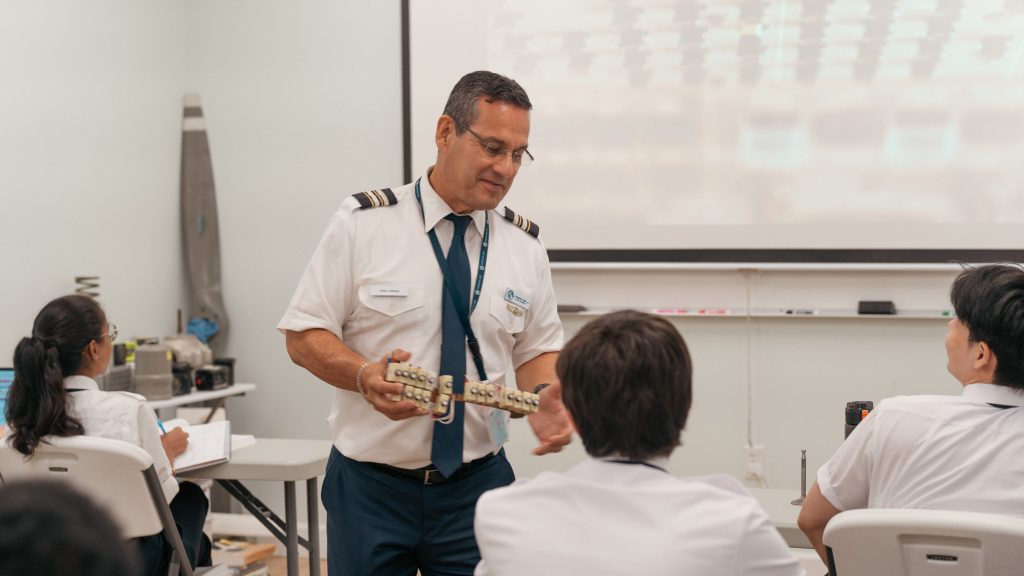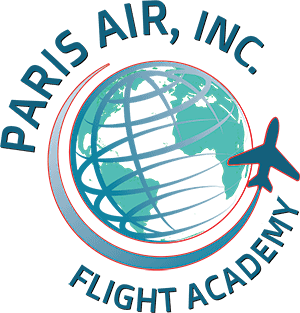Whether you’re brand new to aviation or exploring where to take your flight training, you’ve likely come across the terms VFR and IFR. These acronyms aren’t just jargon—they represent two foundational types of flying that every professional pilot must understand. At Paris Air, we train you to master both, because each plays a vital role in becoming a safe, confident, and capable aviator.

What is VFR?
VFR stands for Visual Flight Rules, a set of regulations used when flying in good weather conditions. Under VFR, pilots rely on visual cues outside the cockpit—such as landmarks, the horizon, and other aircraft—to navigate and maintain separation.
Key Features of VFR:
- Requires clear skies and good visibility
- Pilots navigate using maps, terrain, and visual landmarks
- Common during early stages of training (especially the Private Pilot License)
- Less restrictive than IFR, but highly dependent on weather conditions
VFR flying allows new pilots to build hands-on skills and awareness, forming the basis for all future training.
What is IFR?
IFR, or Instrument Flight Rules, is used when visibility is poor or when flying in controlled airspace. Under IFR, pilots must rely on instrument readings and communication with air traffic control rather than visual navigation.
Key Features of IFR:
- Required for flying in clouds, fog, or other low-visibility conditions
- Heavily dependent on cockpit instruments
- Necessary for commercial flying and longer-distance travel
- Requires an additional instrument rating on top of your private pilot license
Mastering IFR is essential for flying in a broader range of conditions and becoming a professional pilot.
How Paris Air Trains You for VFR and IFR
At Paris Air, we believe that the best pilots are those who are confident in any condition. That’s why our training programs are designed to guide you step-by-step—from your first VFR flight to advanced IFR procedures.
Our Training Includes:
- A structured approach starting with VFR during your Private Pilot License (PPL)
- Progression into Instrument Flight Training with real-world IFR scenarios
- Access to cutting-edge flight simulators and a diverse fleet
- Experienced instructors with thousands of hours in both VFR and IFR environments
We don’t just prepare you for tests—we prepare you for real-life flying.
Why Understanding VFR vs. IFR Matters for Your Career
To be successful as a commercial pilot, you’ll need to fly confidently under both VFR and IFR conditions. Airlines, corporate aviation companies, and flight schools expect their pilots to handle unpredictable weather, air traffic control systems, and complex flight paths. Being well-trained in both sets of rules ensures you’re ready for whatever the skies bring.
Why Vero Beach is the Perfect Place to Train
Located along Florida’s Treasure Coast, Vero Beach offers an ideal environment for both VFR and IFR training. With over 230 sunny days per year, our students get more time in the air—an essential part of learning.
At the same time, coastal weather patterns provide just enough variability to offer practical IFR experience, giving you the tools to adapt and succeed.
VFR and IFR: Local Advantages
- Frequent clear skies perfect for VFR practice
- Occasional real-world IFR conditions for instrument training
- Flat terrain and modern regional airports
- Easy access to Class C and D airspace, ideal for hands-on ATC experience
- Coastal routes for diverse cross-country missions
At Paris Air, you get the benefit of flying in an environment that’s both student-friendly and career-building.
Ready to Take Off?
Whether you’re dreaming of flying for a major airline or simply pursuing your passion for aviation, understanding VFR and IFR is your first step—and Paris Air is the place to begin.
📞 Contact our admissions team today to learn more about our programs and start your flight training journey in beautiful Vero Beach, Florida.

